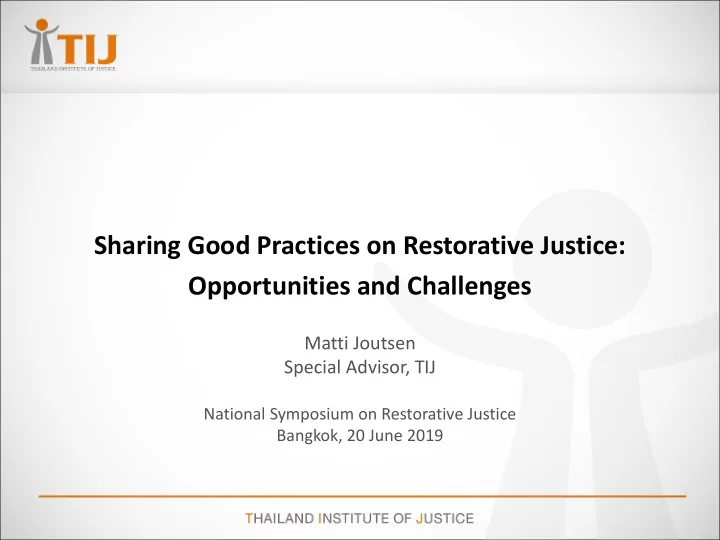

Sharing Good Practices on Restorative Justice: Opportunities and Challenges Matti Joutsen Special Advisor, TIJ National Symposium on Restorative Justice Bangkok, 20 June 2019
Sharing Good Practices on Restorative Justice: Opportunities and Challenges Thailand, among other countries, has introduced restorative • justice into its criminal justice system – need to keep the viability of restorative justice programmes under review (including ensuring that they operate in an appropriate manner) – need to consider expansion of their present use through training and allocation of resources – need to consider expansion to other groups of offenders and / or types of offences, including serious offences
Sharing Good Practices on Restorative Justice: Opportunities and Challenges challenges: often due to preconceptions • these preconceptions may “starve” RJ programmes of cases • and resources, or of acceptance by key stakeholders preconception 1 : “crime should be dealt with by the • (formal) criminal justice system” preconception 2 : “there is no suitable structure in the • community for dealing with these matters” preconception 3 : “restorative justice is too lenient on the • offenders” getting the community, victim advocates, defence counsels • and practitioners to understand that these are, largely, mis conceptions leads to a win-win situation
Sharing Good Practices on Restorative Justice: Opportunities and Challenges preconception 1 : “crime should be dealt with by the • (formal) criminal justice system” – preconception that restorative justice is suitable at most for juvenile offenders and petty crimes – protection of “turf”: criminal justice practitioners understandably see themselves as the professional “experts” in responding to crime – restorative justice can achieve crime prevention and criminal justice functions more effectively, humanely and efficiently – in practice, formal criminal justice processes already include an extensive element of discretion
Sharing Good Practices on Restorative Justice: Opportunities and Challenges preconception 2 : “there is no suitable structure in the • community (or in our culture) for dealing with these matters” importance of strengthening the community’s resilience and • capacity to deal with problems – these vary from one country to the next, and vary within a country, depending on the community and on the nature of the conflict – existing indigenous structures and processes – religious communities – village elders – civil society organizations – schools
Sharing Good Practices on Restorative Justice: Opportunities and Challenges preconception 3 : “restorative justice is too lenient on the • offenders” – what is the criteria for “leniency”? (and what are the goals of formal criminal justice – retribution, rehabilitation, reintegration, general prevention … ?) – myth of the “popular demand for justice” (which can result in “penal populism”): but note that there is also popular support for reparation and active participation – a restorative justice process may be quite demanding on the offender
Sharing Good Practices on Restorative Justice: Opportunities and Challenges the restorative justice approach works • – it works as an alternative or as a complement to formal criminal justice processes it has the potential for empowering victims and increasing • victim satisfaction with the outcome it has the potential for changing the conduct of the offender • and reintegrating him / her back into the community it has the potential for strengthening the local community’s • capacity to deal with problems, and for improving the sense of safety in the community
Sharing Good Practices on Restorative Justice: Opportunities and Challenges thank you! matti.j@tijthailand.org
Recommend
More recommend